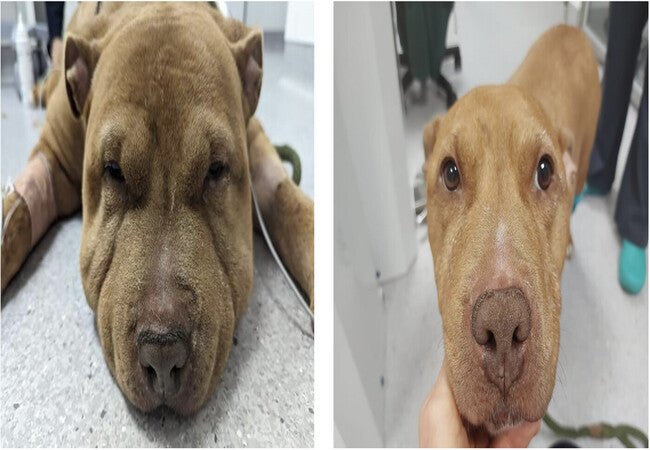Veterinary Guide to Canine Myxedema Coma 2025: Emergency Diagnosis, Treatment & Recovery 🐶🩺

In this article
Veterinary Guide to Canine Myxedema Coma 2025: Emergency Diagnosis, Treatment & Recovery 🐶🩺
By Dr. Duncan Houston BVSc
🔍 What Is Myxedema Coma?
Myxedema coma is a rare, extreme manifestation of severe, prolonged hypothyroidism in dogs that triggers stupor or coma, significant hypothermia, bradycardia, hypoventilation, thick skin, fluid imbalances, and metabolic disturbances.
📊 How Rare & Who’s at Risk?
- Occurs in only a small subset of dogs with untreated hypothyroidism.
- Most affected are middle-aged (4–10 years), especially Rottweilers, and those with long‑standing thyroid disease.
- Often triggered by additional stress—cold exposure, infection, sedation, or metabolic crash.
⚠️ Symptoms to Recognize Early
- Dullness evolving into stupor, coma, or near‑coma.
- Severe hypothermia—cold skin without shivering.
- Marked bradycardia, hypoventilation—may require ventilation.
- Non‑pitting (“boggy”) facial/limb swelling, tragic expression from mucopolysaccharide buildup.
- Lab abnormalities: hyponatremia, hypoglycemia, hypercholesterolemia, non‑regenerative anemia.
- Often concurrent depression, hepatic dysfunction, and organ failure tension.
🧪 Diagnosis: What to Check Now
- Thorough physical exam noting temperature, mentation, vitals, skin swellings.
- Bloodwork: CBC, chemistry for sodium/glucose/lipids/liver; thyroid panel (TT4, free T4, TSH).
- Rule out other causes of coma, hypothermia, hypoglycemia, or hyponatremia.
- Imaging/liver evaluation if suspected hepatopathy, as often seen in coexisting acute disease.
🩺 Emergency Treatment Steps
1. Stabilize Thermoregulation & Breathing
- Gradually rewarm with blankets and ambient heating (avoid rapid flips).
- Provide oxygen; ventilator if severe hypoventilation or CO₂ retention occurs.
2. Intravenous Levothyroxine
Administer 5 μg/kg levothyroxine IV q12h begins clinical improvement within 24–30 h. Therapy may continue orally once swallowing is safe.
3. Support Hydration & Solutes
- IV fluids to correct hyponatremia and hypoglycemia; add dextrose if needed.
- Correct electrolytes slowly to avoid brain swelling.
4. Address Concurrent Conditions
- Treat infections, liver failure, hypoglycemia, and heart issues immediately.
- Consider steroids if adrenal insufficiency suspected.
5. Intensive Monitoring
- Frequent monitoring of mentation, T, HR, RR, blood pressure, labs.
- Support nutrition with NG tube feeding if necessary.
- Manage secondary complications—aspiration risk, thrombosis, infections.
📈 Prognosis & Recovery Outlook
- With rapid IV treatment and supportive care, prognosis is cautiously optimistic—majority stabilize and recover.
- Mortality risk rises when comorbid illness, delayed treatment, or advanced organ failure exist.
- Post‑acute recovery may take weeks; neurologic deficits can remain.
🏠 Aftercare & Ongoing Management
- Transition to oral levothyroxine—usually 0.02 mg/kg PO q24h—adjust dose 4–6 weeks later via recheck labs.
- Monitor T4/TSH every 6–12 months once stable.
- Reassess organ functions; treat persistent hepatic, cardiac, or neurologic sequelae.
- Educate owners on signs of recurrent crises, importance of adherence.
🆕 What’s New in 2025?
- Emerging point‑of‑care thyroid assays for faster diagnosis.
- Refined IV levothyroxine protocols reduce risk and enhance recovery.
- Tele-ICU support via Ask A Vet, including real‑time monitoring & dosage guidance.
- Mobile ICU units available in major cities—critical for remote patients.
🔧 Role of Ask A Vet
- Ask A Vet: 24/7 virtual vet care for symptom triage, stabilization advice, dosage oversight, and discharge planning.
👨⚕️ Final Thoughts from Dr Duncan
Myxedema coma is a life‑threatening emergency, but with swift IV levothyroxine, ICU support, and modern tools like tele‑ICU, dogs can survive and recover. Early recognition—especially in high‑risk breeds with untreated hypothyroidism—is key. Let’s ensure peace of mind: know the signs, act fast, and partner with Ask A Vet to preserve precious lives. 💙
Visit AskAVet.com or download the Ask A Vet app for around‑the‑clock vet assistance through emergency endocrine crises, dosing support, and decision guidance.






